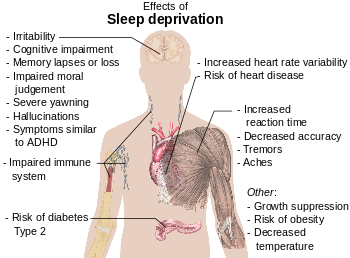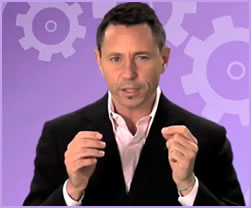- To Change Your Mind - Details Matter
End the Nightmare: Address ADHD Sleep Challenges
ADHD & Nature Immersion – Good for the Body & the Brain
August 9, 2014ADHD Medication 5 Videos – Stimulants Explained – AMP vs MPH
August 31, 2014End the Nightmare of
Not Enough Sleep
Guest Article by: Alan Brown ADHD Coach
As we head into the end of summer, where our routines and daily “rhythms” are less firmly in place – there’s more of a chance that a particularly important rhythm may fall (even further) off: our sleep.
The ADHD Sleep Problem

Main health effects of sleep deprivation (See Wikipedia:Sleep deprivation). Model: Mikael Häggström. To discuss image, please see Template talk:Häggström diagrams (Photo credit: Wikipedia)
First Consider ADHD Sleep Deprivation
I’ll share a few helpful natural remedies/strategies in a moment. But first, let’s make sure we know the extent of the sleep deprivation problem, according to the research:
- It exacerbates our ADHD symptoms, including inattention, hyperactivity, moodiness and irritability, per the National Sleep Foundation.
- It decimates performance: According to a report in the journal Sleep, researchers found even moderate reductions in sleep can affect an ADHD child’s academic performance.
- Insufficient sleep lowers metabolism, increases appetite and thereby makes us more susceptible to weight gain/obesity, according to a study by Matthew P. Walker at the University of California, Berkeley. (Sleep deprivation cranks up a hormone called lectin, which holds on to body fat.)
- Oh – and sleep problems can be SO severe as to actually impersonate ADHD and result in an incorrect diagnosis of ADD, per the National Sleep Foundation.
Scientists haven’t figured out exactly why, but we ADHD adults typically have a hard time slowing down our brain at night, which is a key for falling asleep. And then, according to Roberto Olivardia, Ph.D., of Harvard Medical School, we’re more likely to experience restless leg syndrome, sleep-walking and talking. We’re even hyperactive sleepers! Not a happy contrast with the joys of sleep and its fabulous rewards of clarity, contentment and sanity, is it?
Some Natural ADHD Sleep Remedies for Crummy Sleepers
When other people are winding down and feeling sleepy, we ADDers are starting to wind UP. Our circadian rhythms are programmed differently, so instead of winding down at 10pm, we’re firing up a bunch of thoughts, worries, ideas, etc. But there are a few things we can do to counter our dysfunctional internal clock:
- No Media 1+ Hours Before Bed: UNPLUG!!! Get off of media earlier in the evening – at least 1-2 hours before bed. Your ADHD brain has momentum, making it difficult to just shut it off. Plus, research shows that the rays emitted from e-devices tricks our brain into thinking it’s daytime.
- Medication Conservation: While some claim that their stimulant meds actually help them get to sleep (perhaps by allowing them to focus their mind on falling asleep), we have to remember what meds might still be swimming around in our veins from the daytime. For instance, I don’t use sustained-release meds for this reason. When I’m done working, I want to be done chirping.
- A Visit from the Protein/Dairy Fairy: Get a little sprinkle of serotonin and melatonin from cottage cheese or warm milk before bed.
- Get the Caffeine Out: Even small amounts – even early in the day – can affect our ability to fall asleep. You don’t have to go decaf, but I won’t judge you if you do (I do a 5-shot decaf latte, and I’m proud).
- Make Bedtime Routine a Routine: You have to train your brain to know it’s time…to…wind…down. Change into bed-clothes earlier. Turn down lights earlier. Take a quick bath. Turn on some ambient/white noise. Whatever the routine…do it routinely.
- Set a Bedtime Alarm: That’s right – set an alarm for the same time every evening that reminds you it’s time to shut the TV…laptop…knitting bag…book.
Sleep Studies Address Other Realities
And lastly, Get Tested: If you’re waking up in the morning and feeling tired or like you never slept, you should absolutely check for snoring/sleep apnea – not breathing in enough oxygen. But even if that’s not the issue, only a professional sleep test can give you reliable data on something correctable like a breathing issue.
Decreased oxygen directly relates to decreased cognitive abilities and increased memory problems.
We should all regard sleep as absolutely foundational, because every other alternative ADHD treatment or solution you put into play will have exponentially more impact if it’s done on top of a better night’s sleep.
—————-
Alan's Excellent Video At Tedx San Diego 2012 – 3.47 min
—————-
Sweet Dreams…
-Alan
 Alan Brown Bio:
Alan Brown Bio:
An entrepreneur and coach, Alan’s the creative force behind ADD Crusher™ videos for ADHD teens and adults. Undiagnosed for decades, his untreated ADHD manifested in under achievement, failed relationships, substance abuse, and worse. Once diagnosed, he found it difficult to learn coping strategies from books, so he developed his own proven strategies while building a successful advertising career and several start-ups. A featured presenter at ADHD conferences and webinars in the U.S. and abroad, he gave a TEDx Talk on the plight of undiagnosed ADHD adults.
Alan's eBook: Download his free eBook, “5 Things You’re Doing Every Day that Make Your ADHD Worse” at ADDCrusher.com.
Training: Then, as an expression of his appreciation for guest posting here at CorePsych Alan is offering this discount while you're over there on his training modules: “ADD Crusher™ Videos and Tools provide street-smart alternative ADHD solutions recommended by ADHD coaches/clinicians the world over to help teens and adults escape the overwhelm and live to their potential.” Use coupon code COREPSYCH15 to save 15% off any purchase at ADDCrusher.com – it's a win-win.
—————-
It's been great working with you Alan. Thanks for your excellent insights and recommendations! Check out ADD Crusher for more excellent video insights on ADHD recovery.
Please like and forward ↓ Alan's excellent article – it's an absolutely important part of ADHD self management!
cp
Dr Charles Parker
——–
Connect & Subscribe To CorePsych: This Link
Connect & Subscribe For Core YouTube Updates: This Link







6 Comments
Dr. Parker, My youngest son, 22, and I met you several months ago in your office. This article IS my older 2 children. I want to know if there really is a way to help them sleep. They have tried several medications. I am desperate to help them, although they are over 18. Thanks for all you do.
Terry,
Got you covered off line. Hope to see you soon.
cp
Hello,
My son is 5 years old and was diagnosed with ADHD when he was three. Recently, we had a sleep study done because I wasn’t convinced that all his “problems” were ADHD. Since then, we’ve discovered he has apnea, leg twitches, and a mild form of narcolepsy. He’s a mover and a shaker all night long with sleep walking, talking and the odd night terror. Do you have any advice as to what we should try to help him get some more restful sleep at night? The doctor was not very forthcoming. We’ve made an appt with an ENT about his tonsils and adenoids that are growing back. He had them removed just before his 4th birthday. Thanks for any advice you may have!
Gina,
Younger children [and others] with an abundance of likely medically related problems need several tests to unearth their possible underlying biomedical contributions. I’m always updating my recommendations as I continue to learn and report to readers further options. At this moment the tests I use and links for more info are available on this PDF: http://corepsych.com/tests14
I’m attending an important meeting in this regard in Chicago in mid October, so sign up on the CorePsych Services page, and stay tuned. I’ll report on those additional changes as soon as I get a weekend to gather, condense and load up over there on http://SlideShare.net/drcharlesparker for easy downloads. [See the Dr Bill Walsh Videos at the bottom of this page to understand my next steps: http://corepsych.com/critical ]
For now, for a child as you describe we are about 80% likely to find imbalances with the current tests. If you wish a complimentary Brief Chat with me to discuss options set it up through Desiree on that Services page.
cp
Dear Dr. Parker – this entry is excellent. However, do you have any advice for those of us with sleep-deprived ADHD teens? Getting them to put down electronics for 1+ hours before sleep is beyond impossible. We do turn off wifi at night and put phone time restrictions on; however, our “zone of parent control” is nearing an end and bedtime/sleeptime has become a battle-ground. Sleep tests show very mild sleep apnea. We use melatonin but that seems to work inconsistently. We have shared your blog with our teens, hoping they will begin to take responsibility for their health. Help!
Pamela,
Most adolescents I see in our office for many years really do want to go to sleep, but just can’t hack it. They don’t get tired and need more aggressive help. We use sleep aides/meds all the time to take care of that problem for-sure – and they love their progress. Clonidine is my next fav after Melatonin doesn’t work .5-1 of the 0.1 mg and get into bed at 10 shooting for 8 hr of sleep.
Other natural items than can help = L-theanine and but I don’t throw supplements around without first measuring to absolutely know what I’m doing.
Tell them if they don’t get in bed you will have to get into bed with them and read them a fairy tail… that should frighten them into corrective action 😉
cp